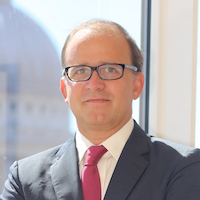This month:
Markets hit with a mid-cycle tantrum
No meaningful rise in US inflation raises questions.
Hopes rise for a solid roadmap for Brexit.
Global growth looks set to continue.
A classic “mid-cycle tantrum” emerges.
Featuring this month’s experts:
Economic and political developments have triggered significant market volatility which may have investors alarmed, but arguably what we’re seeing is simply a return to normality.
Here, leading wealth managers from our panel give their views on recent events and explain the key risks – and opportunities – investors should be thinking about.
Big developments around the globe
Insights from:

Colin MacKenzie, Director, Investment Management, at Arbuthnot Latham & Co., Limited, says:
In broad terms, following an aggressive sell-off in early February, global financial markets recovered around half of the ground lost, before easing back a little into the end of the month – the trigger for this recent pick-up in market volatility being stronger than expected employment and wages reports in the US.
With unemployment hovering around 4.1%, the lowest level in 17 years, the US economy is seen to be at full employment, so upward pressure on wages should come as no surprise. What is puzzling, however, is the fact that the past 10 years or so of extensive monetary stimulus has yet to spark a meaningful pick-up in inflation, though Trump’s recently-enacted tax cuts just may be the event that sees inflation finally re-emerging from the doldrums.
The US Federal Reserve, complete with its new Chairman, faces the prospect of raising interest rates to stem the threat of higher inflation, but not by so much or too soon that growth becomes diminished. Jerome Powell confirmed this interpretation in his first testimony to Congress, citing a ‘strengthening economy’, projecting potentially four rates hikes in 2018.
The middle of February also saw the start of the Chinese or lunar New Year of the Earth Dog. Trump’s ‘bark’ might often prove to be worse than his ‘bite’, but recent moves to impose US trade tariffs on steel and aluminium imports could ignite a trade war, something which will almost certainly be a headwind to global growth.
Closer to home, the European markets have had political events to contend with: the Italian election in early March saw the Five Star Movement, an anti-establishment and anti-European party, winning the most seats but falling short of being able to form a government; and after months of political deadlock, Angela Merkel was able to form her fourth government via another grand coalition.
![]()
The US Federal Reserve, complete with its new Chairman, faces the prospect of raising interest rates to stem the threat of higher inflation, but not by so much or too soon that growth becomes diminished.
At home, in a speech at Mansion House, Theresa May set out her Brexit vision, confirming intentions to leave the single market but highlighting a conciliatory tone when identifying issues with the Irish border. Corbyn, meanwhile, changed tack pledging to keep the UK within the EU customs union. We await the Spring Statement – no longer a Budget or a major fiscal event, but will it contain some good news?

Colin MacKenzie
Director, Investment Management, at Arbuthnot Latham & Co., Limited
Roadmap to Brexit
Insights from:

Dean Turner, an economist at UBS Wealth Management, says:
Last week, Theresa May set out her vision for Brexit in a speech that offered a welcome dose of reality and solutions to outstanding thorny issues. Announcing a range of pragmatic solutions, she managed to reach out to her divided party while acknowledging to the EU that the UK cannot have its cake and eat it.
The speech seems to have had the desired impact at home, at least for the near term. Both the Conservative Party Brexiteers and Remainers have been largely supportive of it, which should give her some breathing space to negotiate a transition deal with the EU.
While the atmosphere and rhetoric around the UK-EU talks is likely to remain charged, we believe that such an agreement will emerge by the end of March or soon after. From a purely economic perspective, this would likely ensure that any changes to the status quo are delayed until at least the end of 2020.
Should such a deal be reached, some of the downside risks facing the UK economy would ease in the short term. We’d expect business and consumer confidence to grow, encouraging the Bank of England to hike rates this year. It would also open the way for the pound to move higher.
From an investment perspective, then, we see little reason to change our UK market outlook. But an interim agreement at best only delays the hard work and choices ahead.
![]()
While the atmosphere and rhetoric around the UK-EU talks is likely to remain charged, we believe that such an agreement will emerge by the end of March or soon after.
What kind of arrangement endures beyond 2020 remains to be seen, but one thing seems certain. The final deal, as Donald Tusk emphasised, is likely to be the first in trade history that will weaken, not strengthen, economic ties. We shouldn’t forget the potential negative economic consequences for all concerned.

Dean Turner
An economist at UBS Wealth Management
A return to normality
Insights from:

Ben Kumar, Investment Manager at Seven Investment Management, says:
The volatility we have seen so far this year is actually quite a normal state of affairs – we’ve simply been lulled into a false sense of security by very recent history and completely forgotten that this is how markets usually behave.
Overreacting would be akin to having a couple of hot weeks in September, and deciding that you will never need central heating again. Even just going back to 2016, what is currently happening was reasonably ‘normal’ – markets moved by 1% or more nearly 50 times, rather than the eight days for the whole of 2017.
![]()
The volatility we have seen so far this year is actually quite a normal state of affairs – we’ve simply been lulled into a false sense of security by very recent history and completely forgotten that this is how markets usually behave.
Bull markets do not simply run out of steam – they need a catalyst, yet global growth looks set to continue. Even so, we have slightly lower than average equity holdings (markets look expensive, but can certainly continue growing), decent cash allocations (to pick up any opportunities), and have invested in some other defensive measures. These should help mitigate any pain and, more importantly, could provide chances to invest cash into attractive assets should the opportunity arise.

Ben Kumar
Investment Manager at Seven Investment Management
A “Regime Change” has taken place
Insights from:

Tom Becket, Chief Investment Officer at Psigma Investment Management, says:
The last few weeks have brought a bout of volatility that shook markets from a long period of unnatural calm. Having seen eighteen months of one-way trading upwards, financial markets have reminded investors that they can go down, as well as up.
Such a move was long overdue and, while undoubtedly unnerving for investors, is nothing ‘out of the ordinary’ by comparison to other such events in the past. Indeed, the period of healthy returns with no bumps in the road was more of an aberration than the roller-coaster behaviour of the last few weeks.
The wider response from the financial press and investor community is that markets will soon settle down after this ‘blip’ and restart immediately upon the rewarding path that they have been on in recent years. Whilst we don’t disagree that investors can still reap rewards by remaining invested in certain assets, we don’t share the view that we are going back to the ‘blue sky’ scenario of the last few years.
![]()
So much has been transformed in the last couple of months that we feel that a ‘regime change’ has taken place in financial markets and investors must adapt to maximise the opportunities and reduce the risks that this new regime will throw up.
Indeed, so much has been transformed in the last couple of months that we feel that a ‘regime change’ has taken place in financial markets and investors must adapt to maximise the opportunities and reduce the risks that this new regime will throw up.
Our views should not be taken as a call to pursue a totally cautious approach to the years ahead, not least as we still expect both positive economic growth and solid corporate profits in 2018, but it is a time to ensure that investors check whether the asset allocations that have served them well over the last few years are still appropriate. The swirling winds over global trade, fiscal policies, interest rates and inflation could make the next few years a more turbulent period for investors, after a lengthy period of calm.
Our investment strategy reflects our view that we have entered a new regime; we feel confident in our positioning and investment selections, and well placed to achieve our long-term investment aims.

Tom Becket
Chief Investment Officer at Psigma Investment Management
Equities set to beat bonds for the foreseeable
Insights from:

Duncan Gwyther, Chief Investment Officer at Quilter Cheviot Investment Management, says:
Since the financial crisis, equity market corrections have usually been triggered by global growth scares, but on this occasion the strong upturn in nominal GDP growth has led to tightening labour markets and fears that the era of negative real interest rates is ending as central banks abandon quantitative easing and raise interest rates.
![]()
Global economic activity is as strong as it has been for a decade, with GDP growth estimated to be around 3.5% this year and next.
Although this is not ‘new news’, the cyclical upturn in the eurozone and Japan means their central banks are on the cusp of policy change, and will follow a similar path to the US and UK. While it may suggest the economic cycle has peaked and growth is unlikely to accelerate, this does not – in our view – mark the end.
Global economic activity is as strong as it has been for a decade, with GDP growth estimated to be around 3.5% this year and next. Consumption continues to be the main driver, but a cyclical upturn in US and eurozone manufacturing has boosted trade and industrial production elsewhere. The recent sharp upturn in US imports, strong consumer and business confidence and approval of the US fiscal package pave the way for increased corporate investment. Estimated GDP growth of 6.5% is still very strong – and well above the 4.8% average for emerging economies – but the deceleration from close to 7% could have repercussions for the global economy. As equity market drawdowns are a common occurrence, we are not overly concerned by recent developments. With the economic and monetary backdrop remaining favourable for corporate profitability, equities should produce better returns than bonds over the foreseeable future.

Duncan Gwyther
Chief Investment Officer at Quilter Cheviot Investment Management
In a world of so much uncertainty, how should you position your portfolio?
Insights from:

Christian Armbruester, Chief Executive of Blu Family Office, says:
The world is moving so fast now, it is hard to keep up. Just a couple of months ago, we were worried about runaway equity bull markets, rising interest rates and the winter Olympics. Now, we are concerned about a global trade war that may or may not have already started, and maybe looking at the beginning of world peace if Trump and North Korea can come to an agreement.
So, what is our investment view for March? In the words of a very famous macroeconomist: ‘Things can go up, but most certainly there is also a chance that things go down, and there is a distinct possibility that we go sideways as well.’
With so much wisdom about, we recommend that you do hold on to some equities (public and private), because you cannot risk not to be involved if we keep printing up. We are wary of public bonds, mainly because we don’t like the low yields and the risk of rising interest rates. We do like private lending, real assets, also certain hedge fund strategies and anything else that can offer diversification benefits
![]()
Having a portfolio of investments with different risks and therefore different behaviours, is your best protection against any market event or environment.
Is there a looming crisis, crash or tail risk event ahead? There always is, but you can’t prepare or invest in anticipation of such an event. You just don’t know when it will happen, and it can hence be very expensive paying all those insurance premiums or staying in cash and missing out on potential opportunities.
Do buy some physical gold and store it somewhere safe, if you are worried about Armageddon. Otherwise, having a portfolio of investments with different risks and therefore different behaviours, is your best protection against any market event or environment. And it also means you don’t have to take a view – happy days!

Christian Armbruester
Chief Executive of Blu Family Office
Is the UK market an opportunity for outperformance?
Insights from:

Caspar Rock, Chief Investment Officer at Cazenove Capital, says:
Over the last 12 months, and since the beginning of 2018, the UK equity market has underperformed other global markets in both local currency and sterling terms.
The UK economy continues its steady growth path, although compared to the rest of the world it is in the slow lane, while inflation is still elevated due to the post-referendum weakness in sterling. The UK equity market is now valued at a discount to global markets on an earnings-yield basis, and is one of the few markets to have a yield premium to investment-grade bonds. So – on a relative basis – it is cheap, although not necessarily on an absolute basis. From a sentiment point of view, it is the biggest negative position compared to history for those investors who respond to the Bank of America Merrill Lynch Global Fund Manager Survey.
![]()
The UK equity market is now valued at a discount to global markets on an earnings yield basis, and is one of the few markets to have a yield premium to investment-grade bonds.
The question for asset allocators is whether this underperformance will continue, or can the market stage a relative recovery? Given the conditions outlined above, everything should be aligned for some outperformance. However, given the level of political uncertainly around the Brexit negotiations and the precarious majority of the Conservative/DUP coalition government, there is a struggle to see a catalyst to change the situation.

Caspar Rock
Chief Investment Officer at Cazenove Capital
Market volatility is a classic mid-cycle tantrum
Insights from:

Daniel Casali, Partner at Smith & Williamson, says:
Much attention has been given to the recent market volatility, but it does seem it is more of a classic mid-cycle tantrum, rather than the start of a bear market – like the 2000 and 2008 moves.
First, the growth outlook is improving and broadening. Second, contagion from the equity market has not spread to the credit markets, as it did in 2008. Third, underlying measures of inflation are still subdued. Excluding food and energy, this so-called ‘core’ consumer price measure of inflation is running below 2% for the US, the eurozone, China and Japan. Provided that inflation remains subdued, central banks are likely to remove monetary accommodation slowly.
There is a new Chair for the US Federal Reserve, Jerome Powell, who remains an unknown quantity. This may keep markets jittery in the short term, but essentially, we remain positive on markets and would add to equity positions from here.
Turning to fixed income markets, US Treasury yields have risen to nearly 3%, a rate last seen in late 2013. Investors are wary that US tax cuts and increased infrastructure spending could drive yields even higher. However, provided global growth holds up to backstop company earnings, rising bond yields should not be feared, and particularly when there is plenty of liquidity in the global financial system.
![]()
There is a new chair for the US Federal Reserve, Jerome Powell, who remains an unknown quantity. This may keep markets jittery in the short term, but essentially, we remain positive on markets and would add to equity positions from here.
Importantly, interest rates are still too low to worry credit markets about debt defaults, a more serious risk to equity markets. For example, the cost of servicing US household debt is close to historical lows at 10.3% of take-home pay. The fact is that over the past 10 years US households have reduced debt relative to take-home pay by their biggest amount since World War Two. Lower debt should increase the ability of households to absorb higher rates.

Daniel Casali
Partner at Smith & Williamson
Important information
The investment strategy explanations contained in this piece are for informational purposes only, represent the views of individual institutions, and are not intended in any way as financial or investment advice. Any comment on specific securities should not be interpreted as investment research or advice, solicitation or recommendations to buy or sell a particular security.
We always advise consultation with a professional before making any investment decisions.
Always remember that investing involves risk and the value of investments may fall as well as rise. Past performance should not be seen as a guarantee of future returns.
